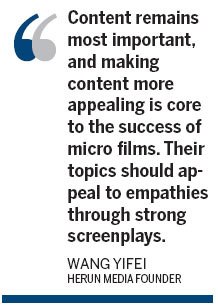

 |
|
The plot of the popular micro film @Love focuses on the annual Spring Festival travel rush and the marital attitudes of people born after 1990. Photos Provided to China Daily |
 |
|
A scene from the @love episode, Love at First Sight. |
Online micro films are growing more popular with viewers and advertisers, giving TV shows and feature-length movies a run for their money. Sun Li reports.
A big competition between online "micro films" and feature-length films has begun.
 |
|
@Love: Home |
The latest micro film to make it big is the 10-episode short @Love. The finale garnered more than 12 million clicks since its Feb 6 release.
Major episodes of the series were nominated for the best short film category at this year's Harbin Ice and Snow Film Festival.
Nanjing University hosted the First University Student Micro Film Festival on Feb 29 to identify young film talent and encourage students to shoot more creative micro films.
Director Li Zichao, who specializes in shorts, says there is no official definition of "micro film", but there is a consensus on the term's meaning.
"As the term suggests, micro films are short films that run for three minutes to half an hour," Li says.
 |
|
@Love: Dream |
"They have small budgets and are completed in a few weeks. They don't appear in theaters but are streamed on video sites and social networks."
More than 40 million Chinese only watch TV shows online, according to the 2011 China and Foreign TV Industry Report by vice-president of China International Television Corporation Zhang Haichao.
Tsinghua University's School of Journalism and Communication professor Yin Hong says: "Micro films are usually light-hearted stories that depict reality."
Yin says the starting point for micro films' popularity was 2010's Old Boys, an uplifting short about two ordinary people striving to become musicians. The flick racked up millions of views on the video site Youku within a month after it was posted on Oct 28.
"The preference for watching TV programs online offers exceptional opportunities for micro films," Yin says.
Wang Yifei, the founder of Herun Media, which produced @Love, calls micro films "a timely solution to people's demand for easy entertainment".
"We're in an era of 'fragmentation'," Wang says.
"In our fast-paced society, our time spent on rela

xation is very fragmented, sporadic and limited. It's not as feasible to sit through a two-hour film.
"The micro film has come to our rescue. It has the twists and turns a feature film has but lasts only a few minutes, which is the amount of time we can afford for entertainment."
Micro films still afford time for product placements, which make funding them possible, Wang says.
"But a good micro film doesn't coarsely insert the product in such ways as making it a dialogue focus or including close-ups of the brand logo," Wang says.
"It subtly embeds the brand into the storyline in a way that's not abrasive to viewers."
One @Love episode sponsored by a mobile phone company never shows the characters directly talking about the handset.
"The actor just naturally uses the phone to make calls and take photos when he needs to for the plotline," Wang says.
"The phone's function was demonstrated subtly."
Marketing via micro films is far better than through TV commercials, Commercial Guide magazine editor-in-chief Ling Ping says.
"About 300 million Chinese watch shows on video websites, which are micro films' major platforms," Ling says. "The product image would reach an amazing number of people if placed in a micro film. It's cheaper to invest in a micro film than to produce a commercial and pay a TV station to air it."
The State Administration of Radio, Film and Television (SARFT) announced last year that TV dramas will no longer break to commercials during episodes to better serve viewers.
The ad ban pushed more advertisers to micro film. That, in turn, accelerated the genre's development, Ling says.
Herun Media's Wang Yifei puts it this way: "As more companies sponsor micro films, more micro films are being churned out. There will be mediocre works, and it will become tougher for a micro film to stand out as competition gets tougher."
Wang says the series format of @Love is the best way to go.
"Episodes are more likely to create a buzz than one-offs," Wang says.
"Content remains most important, and making content more appealing is core to the success of micro films. Their topics should appeal to empathies through strong screenplays."
About 100 writers polished the script of @Love and spun the plot to focus on the Spring Festival travel rush and the marital attitudes of people born after 1990 - both issues of viewer interest.
"In the future, our screenwriters will have group discussions to identify hot issues on micro blogs and in the headlines," Wang says.
"We'll establish a database of scripts based on the most discussed topics to ensure a bounty of intriguing stories. Micro films must beef up their content to lead the pack."